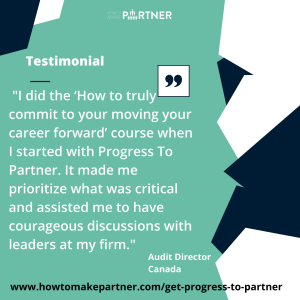How can you get noticed at work without being seen as “showing off”? It’s a fine line between being confident about your strengths and being perceived as arrogant. So, what’s the right way to get noticed at work, to make your partners aware of your many strengths, without rubbing colleagues up the wrong way? Here are 9 ways to get noticed at work and let the partners know just how good we are, without annoying our colleagues.
1. Don’t skip performance reviews
Appraisals or performance reviews can be a painful experience. However, this is the one time in your corporate life when you can freely talk about what you think you are good at. Don’t waste the opportunity to show examples of where things have gone well and any praise or positive feedback you have received. This should help you to get noticed for doing the right things!
2. Work with a mentor or coach
Choose your mentor carefully! In this case, I suggest that you choose a well-connected senior member of your company to act as your mentor. A hard-hitting mentor will often open doors for you, act as your personal advocate, and even fight private battles for you. How great would it feel to have a senior member of your firm openly talking about your strengths to others?
3. Ask regularly for feedback on your performance
Get into the habit of regularly asking for feedback on your performance with your team members, boss, boss’s boss, stakeholders, suppliers, and key customers. Not only will you quickly identify if any of your behaviours need to change, but asking for feedback means that the important people in your career will be regularly thinking about your strengths. Remember you can keep things casual, not everything has to be formal. Feedback need not be a full and lengthy 360-degree exercise, but can be as simple as a one-off question, such as ‘how do you think I managed that meeting with our supplier?’
4. Review your own performance regularly and know what you are good at
It’s your career at stake. Therefore, whether or not your firm has a formal timetable of performance reviews, you should review how well you think you are doing, either monthly or at the end of a project; and remember to consider where you have opportunities for improvement. You can only highlight your strengths to others, if you know (and truly believe) what you are good at. By reviewing your performance regularly and asking for feedback from others, you will be very clear about your personal strengths. For example, if people keep on telling you that you are a great communicator, start to believe it!
5. Define your personal brand
If a member of the board bumped into you in the lift, you need to be able to give them a 50 word summary of the value you personally bring to the company. Could you do this now? According to Peter Montoya, publisher of ‘Personal Branding’, “A personal brand is a promise of performance that creates expectations in its audience. Done well, it clearly communicates the values, personality, and abilities of the person behind it.” Or simply, how would you answer the question, ‘why should you be picked to join my team?’
6. Opt for high profile assignments that play to your real strengths
You are ideally aiming for a situation where your actions speak louder than your words. High profile assignments get your name – and your perceived skillset – on the radar of senior management. What better way to get your employers to take notice of what you can really do? High profile assignments are great for getting you noticed. One word of warning, make sure the assignment you choose plays to your real strengths. Crashing and burning in the full view of senior management is not what you want!
7. Ask for what you want
Don’t wait to be noticed. Don’t be shy about your ambitions. Ideally, people within your firm need to be clear of your career aims. Succession planning in firms happens behind closed doors. You need to make sure that the people involved in succession planning don’t need to second guess your career intentions. If a vacancy looks likely to happen, ask for an opportunity to be considered for the role.
8. Work on a visible development plan
Everyone has strengths and weaknesses. If you are only talking about your strengths all the time, you can come across as arrogant. Be open about your development needs – but be clear about how you are working on them. Employers can always forgive development needs if they can see a clear intent to work on them.
 We have a great course in our subscriber-only site Progress to Partner called “How to Truly Commit to Moving your Career Forward”. It’s a game-changer and will get you focussed and help you to create the time and space to work a little on your career plan every.single.week. Check it out here!
We have a great course in our subscriber-only site Progress to Partner called “How to Truly Commit to Moving your Career Forward”. It’s a game-changer and will get you focussed and help you to create the time and space to work a little on your career plan every.single.week. Check it out here!
9. Build up a relationship with your boss’s boss
All too often people build up a relationship with their boss but make the easy mistake of ignoring their boss’s boss. The best way to do this is to make sure you are visible to them and plan in time for you to grab a coffee and have a chat. You need to make sure you are noticed and that your strengths are known to your boss’s boss. for example, they will be a major stakeholder in any proposed department reorganisations. Don’t wait around to get noticed at work, it probably won’t happen. You have to be prepared to put the effort in. Don’t be shy about your ambitions.
We created the Progress to Partner Academy site to make it as easy as possible to build your partner-ready skills.. There are guides, self-study courses, useful videos, workbooks waiting for you – everything you need to know about how to make partner all in one place!








